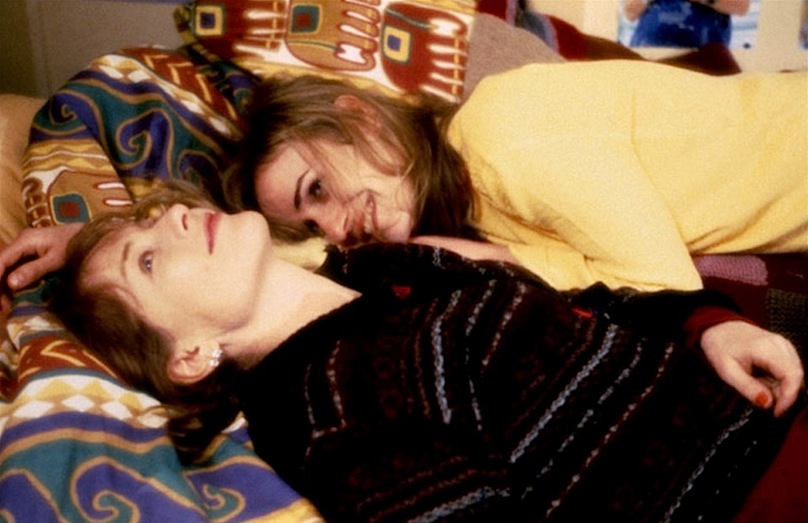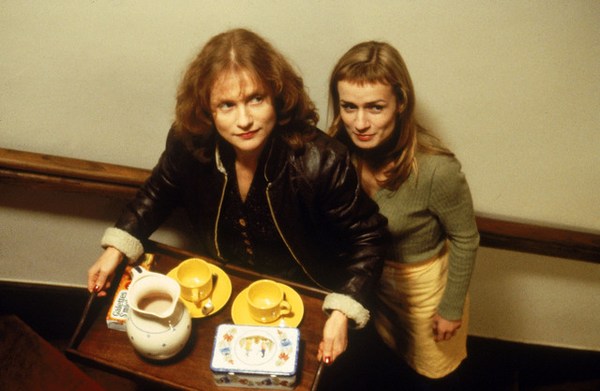
The French have a name for the events leading up to a death by guillotine. They call it “the ceremony.” Although Claude Chabrol’s “La Ceremonie” (1995) contains no guillotines, there is a relentless feeling to it, as if the characters are engaged in a performance that can have only one outcome. It comes as a surprise to all of them, and to us. But given these people in this situation, can we really say in hindsight that we’re surprised?
Chabrol, a founding member of the French New Wave who died in September 2010 having made 54 features, is sometimes said to be influenced by Hitchcock, perhaps because many of his characters become involved in murder but few of them make it a profession. It often comes into their lives as the result of a psychological compulsion set in action by particular circumstances.
“Of course, murder always heightens the interest in a film,” he told me in 1971, at the New York Film Festival. “Even a banal situation takes on importance when there’s a murder involved. I suppose that’s why I choose to work with murder so often. That’s the area of human activity where the choices are most crucial and have the greatest consequences. On the other hand, I’m not at all interested in who-done-its. If you conceal a character’s guilt, you imply that his guilt is the most important thing about him. I want the audience to know who the murderer is, so that we can consider his personality.”
That leads to the question: Does he let us know who will commit murder(s) in “La Ceremonie?” I think he does, although there will be some in the audience who are surprised that anyone in the film is killed. Assuming that some must die (this is a film by Chabrol, after all), it is obvious who they must be. That’s why I won’t issue a spoiler warning: This isn’t a who-done-it. It’s more about how the two murderers do something together that neither would be capable of doing by themselves.
So “La Ceremonie” is about murder. It is also about faces, two in particular. They belong to Isabelle Huppert, as Jeanne, the rude postmistress in a small French town, and Sandrine Bonnaire, as Sophie, a young women who comes to the town seeking work as a maid. In these roles they share a facial quality both often display: They have an almost maddening secrecy. There is also a difference: Jeanne seems all-knowing, cocky, dominant. Sophie, submissive, grateful for attention, doesn’t seem very bright. When she’s told something, she has a way of turning her head slowly and letting it sink in before reacting. The film consistently plants hints of a secret Sophie conceals — a handicap I will not reveal — that indicates that her ability to hold a job indicates she has a gift for deception.
Huppert, the busiest major actress of her generation, wears so well in so many different roles because she only reluctantly reveals a character’s feelings. She leaves it up to us to figure them out; there may be some play-acting involved, but we sense that most is hidden. Above all she’s ideal for characters with an enormous stubborn determination that she holds very much inside. Chabrol has used her seven times, most inevitably in the title role of “Madame Bovary.”
Bonnaire’s face can be equally concealing, but she is better at seeming vulnerable. Her great early role was in Agnes Varda’s “Vagabond” (1985), the story of a young office worker who walks away from her job and sets off optimistically to backpack around French. When he’s found dead in a ditch some months later, we wonder why she continued to fall, and fall, when she had many opportunities to save herself. She will never tell us.
The film opens with a job interview. She meets with a wealthy bourgeois wife named Catherine Lelievre (the bilingual Jacqueline Bisset) in a cafe. They have tea. Catherine explains that she lives in an isolated house in the country, with her husband Georges (Jean-Pierre Cassel) and their son Gilles (Valentin Merlet). Melinda (Virginie Ledoyen), his daughter by an earlier marriage, sometimes comes to visit. They require a live-in maid and cook. All very well with Sophie, who takes command of the interview with almost imperious self-confidence. She has her papers, her letter of reference, her salary requirement. An isolated house is no problem. At the end of their conversation, it’s almost as if Sophie dismisses Catherine.
We see the large, luxurious country estate. Its stone walls contain a service wing, so that family and servants live privately. Everyone gets along at first. In contrast to her manner in the cafe, Sophie seems quiet and submissive here, performing her tasks and then going to her room. There she seems a different person, a naive adolescent, sitting on the floor, leaning against the bed, hypnotized by whatever happens to be on TV.
One day she accompanies Georges into the village, where she meets the postmistress, Jeanne. Huppert seems instinctively to sniff out some quality in Sophie that puts her on alert. She contrives opportunities for them to meet, She is hungry for gossip about the Lelievre family. She has class-conscious scorn for their comfortable lifestyle. She especially believes Madame Lelievre is stuck up and insufferable.
We are watching a seduction. Despite our expectations that lesbianism is possible, it isn’t sexual, but has to do with power. Jeanne senses a weakness in Sophie, a secret, and perhaps believes she can make the other young woman her instrument — to do what, remains to be seen. With nothing in particular in mind, Jeanne knows she will be able to control Sophie in a mutual action. Jeanne drives out to the house frequently, and they meet in Sophie’s room, sneaking up the back stairs, devouring TV programs; when the Lelievres discover her in the house, Georges explodes. Earlier, he accused her of opening his mail. Now he forbids them to see one another. Jeanne’s eyes narrow. Georges has taken a fatal step.
Earlier in the film, Georges discovered alarming background details about both women. Earlier, in other towns, they were touched by two deaths — Sophie’s father, and Jeanne’s young daughter. There is no particular reason to believe either women was responsible for these deaths, but Georges’ research into provincial newspapers indicates there was a certain amount of suspicion. Well, are they murderers? Chabrol never declares himself, and that sets up one of the most disturbing scenes in the movie. Giggling like schoolgirls with a crush, the two tease each other that they know the other’s secret, and the secret is murder. Neither denies it. We suspect one, maybe both, are innocent. By passively allowing such things to be said about them, they create a titillating tension in the relationship. We begin to understand that regardless of whether either has committed murder, together they are certainly capable of it.
Chabrol is at home in the world of the wealthy, and does an effortless job of showing the Lelievre family, confident, affectionate, dining in style, appreciating fine wines, lining themselves up all four on a sofa to watch an opera by Mozart on TV. This is a contrast to the two young working-class women upstairs, whose relationship and the TV they watch is attuned to Sophie’s simplistic mind. Assuming Jeanne is much smarter than Sophie, what we see taking shape is an act of resentful violence, in which the childlike maid is the murder weapon. The film implacably moves toward a horrifying conclusion.
The “La Ceremonie” DVD is available via Netflix. Also in my Great Movies Collection: Chabrol’s “Le Boucher.”




















